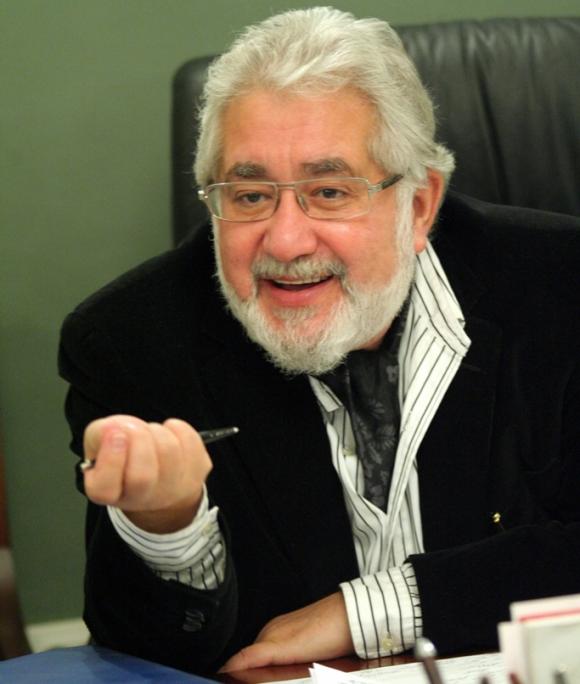de Maria Sârbu

Teatrul „Maly Drama” din Sankt Petersburg prezintă la 29 şi 30 octombrie, ora 19.00, pe scena Sălii Mari a Teatrului Naţional Bucureşti, „Livada de vişini”. Lev Dodin, regizorul spectacolului şi directorul acestui important teatru din frumosul oraş de pe Neva, a acordat un scurt interviu pentru Jurnalul FNT.
28 October 2016, Uncategorized
You’ve performed your “Cherry Orchard” in Europe and in USA. And in Romania the audience is looking forward to seeing the performance. How does the audience influence you when you perform abroad? Is there a big difference between the Russian and foreign audiences?
Lev Dodin: 99 percent there is no difference, as strange as it may sound to the audiences of each specific country. The British warn us in advance that they are a very reserved nation so their audience is not going to cry, and then the British audience comes to our performance and cries; Japanese warn us in advance that they are a very quiet nation so their audience is not going to laugh, and then the Japanese audience comes to our performance and laughs; Italians warn us in advance that they are a very talkative nation so their audience is not going to listen quietly for a long time, and then the Italian audience comes to our performance and listens quietly for a long time, et cetera et cetera. When there is something alive going onstage, then / the same happens in real life / reactions of all nations coincide in 99 percent of the cases. In general we differ from others much less then we like to think and the others differ from us much less then we imagine.
You’ve visited Romania with other performances. What can you say about Romanian audiences?
They are amazing. I’ve grown to greatly respect and love Romanian audiences. To be a bit more verbose, we’ve started touring to Romania many years ago, we still / fortunately / bring our performances to Romania, we perform in Bucharest, in Sibiu, in other Romanian cities. And the Romanian audience continues to / not surprise / but pleasantly astonish me with their fine feeling for theatre, their responsiveness both to meanings and feelings which can be provoked by a theatrical creation.
It might sound banal but every time before performing in Bucharest or elsewhere in Romania we get very nervous. Because we greatly enjoy performing in Bucharest / and in Romania generally / and consider it every time yet another meeting with a long-distance very serious very understanding friend.
Did your visit to the old cherry orchard in AltesLand in Germany influence your work?
It did influence us a lot. To start with, any journey gives you new impressions, new emotions, meeting new people. Every orchard is always a continuation of a human being, the fruit of his labour. Now we know that in a far-off picturesque corner of Germany there is this farmer who goes on caring about this old cherry orchard which has long ago stopped bearing any cherries. Everyone tries to explain to the farmer how stupid this is but the farmer keeps saying “this orchard existed before me and it will stay after me, and then be it as it will”. For me it was the strongest impression
And then of course there was the cherry orchard itself. We’ve heard and read so much about the beauty of Checkov’s cherry orchard. People still dispute if a cherry orchard could be indeed that beautiful. Bunin used to insist that in reality a cherry orchard is rather an ugly thing and that Checkov lauded its beauty so strongly only because Checkov as a non-aristocrat did not know what he was writing about. Actors on all the stages of the word for a hundred years by now had been rattling “oh cherry orchard, oh cherry orchard”. Our actors when we started the rehearsals moaned in the same way “oh cherry orchard”. And suddenly in AltesLand we saw this fantastically beautiful mysterious thing, this mysterious space which is hard to risk to enter and almost impossible to leave. Now when in performance we say “our cherry orchard” onstage, we really have something to see and to think about.
You said that today the play “Cherry Orchard” has absolutely new meanings and makes us see many things in a different light. WhatistheCherryOrchardforyoupersonally?
If we are to suspend for a minitu everyone’s fear of high-flown words, the cherry orchard for me is any fruit of many centuries of human culture: a creation of human hands, of human mind, of human spirit. We often think / humans often think, it is not a special malady of our times / humans always have thought that with the arrival of their epoch all previous epochs become superflious, something that is not necessary anymore and thus to be destroyed. This is why every new epoch proves to be very easy to destroy by the next new epoch. Why this keeps happening and how and if it can be avoided / is probably the main tragic quiestion of this play by Anton Checkov.
The audience, sitting so close for this performance, is the symbol of the Cherry Orchard for you? Or the symbol of the new life that is going to supplant the Cherry Orchard?
The audience in the theatre hall tonight is always exactly this, the audience in the theatre hall tonight. Meaning the audience sitting in the Grand Hall of the National Theatre of Bucharest on Saturday 29 October or Sunday 30 October. These people sit in the auditorium of this great big theatre, this theatre was built quite long ago, this theatre has a long and celebrated history, this theatre in a way is these people’s home. The way these people / the audience feel about this home, these walls, the way they treat this home, is also in a way one of the themes of our performance.
